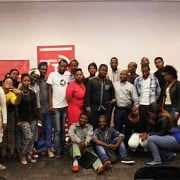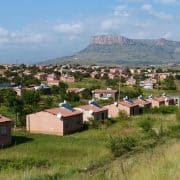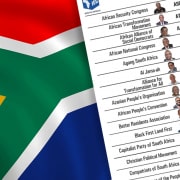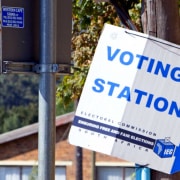|
Getting your Trinity Audio player ready...
|
By Lwazi Nongauza
Gauteng Activators joined dozens of young people from Gauteng in robust dialogue about youth participation in elections, at Corruption Watch’s third Integrity Lecture last week. The event took place in Braamfontein at Constitution Hill on 23 October.
The Corruption Watch youth campaign event Youth To The Polls was hosted by human rights activist and social change driver Mzwandile Banjathwa. It interrogated the current electoral system, underlying reasons for youth voter decline, and many factors that have a potential to affect the upcoming municipal elections. The event was supported by Constitution Hill, the Independent Electoral Commission (IEC), Local Government Action group, and Activate Leadership.
Corruption Watch is a leading civil society organisation whose objective includes fighting corruption and the abuse of public funds in South Africa. The organisation also provides a platform for young people to interact and engage with public figures and institutions that represent ethics and integrity on various topics around corruption, transparency, governance and socio-economic matters.
In the past, Corruption Watch has mounted a youth campaign under the theme #MyHandsAreClean, with the aim of helping youth to understand what it means to live in a constitutional democracy, how corruption affects, them and the role they have to play. Moving forward, the organisation plans to host several activations on university campuses.
Issues that could drive youth away from the polls
Participants highlighted a number of critical observations from past elections that might discourage young people from going to the polls in 2016. Those issues include:
- youth being used to gain positions and then neglected after the elections,
- the role and the mandate of local government,
- the patronising and emotional blackmailing communications strategies by politicians during elections seasons,
- the powerlessness of municipal or grassroots leaders (some described councillors as “talking heads with no power to influence policy),
- social economic challenges,
- corruption,
- and maladministration of government
 Gauteng Activator Bongi Ndlovu explained the logic behind Activate Leadership’s support for the youth integrity debates and democracy advancing initiatives. Ndlovu said: “At Activate Leadership we teach youth how to navigate and populate political structures. Organisations such as those you mentioned are key stakeholders in our communities. So, a strategic partnership with them is vital to drive change at the grassroots level.”
Gauteng Activator Bongi Ndlovu explained the logic behind Activate Leadership’s support for the youth integrity debates and democracy advancing initiatives. Ndlovu said: “At Activate Leadership we teach youth how to navigate and populate political structures. Organisations such as those you mentioned are key stakeholders in our communities. So, a strategic partnership with them is vital to drive change at the grassroots level.”
In his presentation, IEC representative Lonwabo Jwili focused on the upcoming 2016 elections. Jwili spoke a little bit about the preparative work that the IEC is doing. He also provided information on how young people can better interrogate political party manifestos, strategies for holding political leaders responsible (while emphasising that the IEC can only work within the stipulated legislation and could not interfere in political and party issues), and other important issues that the electorate needs to know and apply when the need arises.
Youth are not apathetic about politics
Steven Eli Friedman, renowned columnist, political analyst, and national head of the IEC’s Information Analysis Department in 1994, applauded youth who make take time to discuss important issues like elections. The former head of both University of Johannesburg’s and Rhodes University’s Centre of Study of Democracy, Friedman said: “If you look at the figures for participation by young people in our elections, they are high by international standards. So there probably isn’t a way of attracting more young people to the polls.”
Friedman went on to dismiss some of the claims that young people are not interested in top political leadership elections or appointment. “We do not have youth apathy problem here, so there is nothing which needs to be fixed. Voters everywhere tend to be less interested in municipal elections because they feel much less is at stake. Most tend to believe that important decisions are taken at national level or in the provinces.”
Participation in South African local elections is high by the world standards, he said.
Banjathwa encouraged youth to not distance themselves from issues of national importance because the decisions that are taken by elders now will affect youth in future. “I think it is wise to be more active now while things are not that bad because things might be bad when we are older,” he said.
• First published on the website of Activate Leadership








